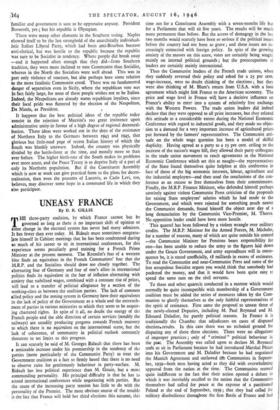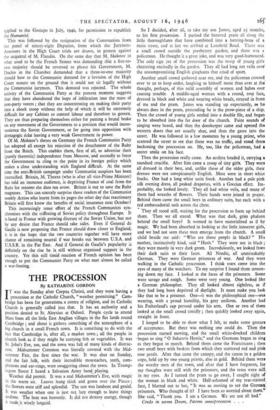UNEASY FRANCE
By D. R. GILL1E
THE three-party coalition, by which France cannot but be governed so long as there is no important shift of opinion or some change in the electoral system has never had many admirers. it has fewer than ever today. M. Bidault must sometimes congratu- late himself in Cabinet meetings that he has been condemned during so much of his career to sit in international conferences, for this experience seems peculiarly good training for a French Prime Minister at the present moment. The Kremlin's fear of a western bloc finds an equivalent in the French Communists' fear that the M.R.P. and the Socialists should draw too closely together. The alternating fear of Germany and fear of one's allies in international politics finds its equivalent in the fear of inflation alternating with anxiety that stabilised wages, combined with a constant rise of prices, will lead to a transfer of political allegiance by a section of the working-class as between the coalition parties. The lack of common allied policy and the zoning system in Germany have their equivalents in the lack of policy of the Government as a whole and the entrench- ment of parties in various ministries to which they seem to be acquir- ing chartered rights. In spite of it all, no doubt the energy of the French people and the able direction of certain services (notably the railways) are steadily producing progress towards French recovery to which there is no equivalent on the international scene, but the lack of coherence, of community in political outlook constantly threatens to set limits to this progress.
It can scarcely be said of M. Georges Bidault that there has been a noticeable increase under his premiership in the tendency of th,t parties (more particularly of the Communist Party) to treat the Government coalition as a fact so firmly based that there is no need to observe rules for gentlemanly behaviour in party-warfare. M. Bidault has less political experience than M. Gouin, but a more commanding personality. His principal difficulty is that he has to attend international conferences while negotiating with parties. But the cause of the increasing party tension has little to do with the personality of the Premier. The most obvious source of the trouble is the fact that France will hold her third elections this autumn, this time not for a Constituent Assembly with a seven-months life but for a Parliament that will sit five years. The results will be much more permanent than before. But the access of demagogy in the last two months would scarcely have been so serious if the political issues before the country had not been so grave ; and these issues are in- creasingly connected with foreign policy. In spite of the growing anxiety of the masses on this score, votes are certainly being sought mainly on internal political grounds ; but the preoccupations of leaders are certainly mainly international.
Thus the Communist leaders of the French trade unions, when they suddenly reversed their policy and asked for a 25 per cent. wage-increase, were no doubt thinking of the elections ; but they were also thinking of M. Blum's return from U.S.A. with a loan agreement which might link France to the American economy. The price and wage level in France wilt have a decisive influence on France's ability to enter into a system of relatively free exchange with the Western Powers. The trade union leaders did indeed declare that they were opposed to all price increases, but they relaxed this attitude to a considerable extent during the National Economic Conference with regard to industrial goods, and they made no objec- tion to a demand for a very important increase of agricultural prices put forward by the farmers' representatives. The Communist atti- tude on the whole wage question has been a model of skilful duplicity. Having agreed as a party to a 15 per cent, ceiling to the increase of the nation's wages bill, they allowed their party colleagues in the trade union movement to reach agreements in the National Economic Conference which set this at naught—the representatives of the State found themselves quite helpless at this conference in face of those of the big economic interests, labour, agriculture and the industrial employers—and then used the conclusions of the con- ference as an excuse to free themselves from their commitments. Finally, the M.R.P. Finance Minister, who defended himself perhaps unwisely against violent Communist Press criticism of the proposals for raising State employees' salaries which • he had made to the Government, and which were rejected for something much nearer the Communist demands, found himself the object next day of a long denunciation by the Communist Vice-Premier, M. Thorez. No opposition leader could have been more hostile.
This quarrel has been followed by a violent wrangle over military credits. The M.R.P. Minister for the Armed Forces, M. Michelet, for a number of reasons, many of which are quite outside his control —the Communist Minister for Pensions bears responsibility for one—has been unable to reduce the army to the figures laid down under the Gouin Government, and army expenditure will in conse- quence be, it is stated unofficially, 18 milliards in excess of estimates. To read the Communist and near-Communist Press and some of the less scrupulous Socialist organs you would think that somebody had pocketed the money, and that it would have been quite easy to spend the same sum on the civil servants.
To these and other quarrcls conducted in a manner which would normally be quite incompatible with membership of a Government coalition must be added the series of measures taken by the Com- munists to glorify themselves as the only faithful representatives of the spirit of resistance. First came the proposal to unseat three of the newly-elected Deputies, including M. Paul Reynaud and M.
Edouard Daladier, for purely political reasons. In France it is traditionally the Chamber that adjudicates on cases of disputed elections results. In this case there was no technical ground for disputing any of these three elections. There were no allegations of improper practices ; only of " criminal " political behaviour in the past. The Assembly was called upon to declare M. Reynaud unfit to sit in Parliament because he had introduced Marshal Petain into his Government and M. Daladier because he had negotiated the Munich Agreement and outlawed tee Communists in Septem- ber, 1939—both men having acted as they did with overwhelming approval from the nation at the time. The Communists seemed quite indifferent to the fact that their action opened a debate in which it was inevitably recalled to the nation that the Communists themselves had called for peace at the expense of a partitioned Poland at the end of September, '939; that they had called for military disobedience throughout the first Battle of France and had
applied to the Gestapo in July, 1940, for permission to republish the Humaniti.
This was followed by the resignation of the Communists from the panel of ninety-eight Deputies, from which the Jurymen- Assessors in the High Court trials are drawn, in protest against the acquittal of M. Flandin. On the same day that M. Molotov in what used to be the French Senate was demanding that a five-to- two majority should be reversed to please his Government, M. Duclos in the Chamber demanded that a- three-to-one majority should bow to the Communist demand for alevision of the High Court statute on the ground that it could not sit legally without the Communist jurymen. This demand was rejected. The whole activity of the Communist Party at the present moment suggests that they have abandoned the hope of infiltration into the mass of non-party voters ; that they are concentrating on making their party into a shock troop without the help of which it will be extremely difficult for any Cabinet to control labour and therefore to govern. They are thus preparing themselves either for putting a brutal brake on any movement of the Government to a position that would incon- venience the Soviet Government, or for going into opposition with demagogic éclat leaving a very weak Government in power.
Of M. Molotov's theses on Germany the French Communist Party has adopted all except his rejection of the detachment of the Ruhr from the Reich. This enables them, first of all, to advertise their (purely theoretic) independence from Moscow, and secondly to force the Government to cling to the point in its foreign policy which makes a close understanding with England difficult. At the same time the anti-British campaign under Communist auspices has been intensified. Britain, M. Thorez (who is after all vice-Prime Minister) has told an immense audience, is depriving France of coal from the Ruhr for reasons she dare not avow. Britain is out to save the Ruhr magnates. This can scarcely surprise those readers of the Communist weekly Action who learnt from its pages the other day that reactionary Britain will first know the benefits of social insurance next October!
This increasingly tense effort of the French Communists syn- chronises with the stiffening of Soviet policy throughout Europe. It is faced in France with growing distrust of the Soviet Union, but not by any desire that France should take sides. Even if General de Gaulle is now proposing that France should draw closer to England, it is in the hope that the two countries together will have more chance of remaining neutral if war breaks out between U.S.A. and U.S.S.R. in the Far East. And if General de Gaulle's popularity ;s definitely on the rise he is still without organised support in the country. Yet this still timid reaction of French opinion has been enough to put the Communist Party on what may almost be called a war-footing..



























 Previous page
Previous page